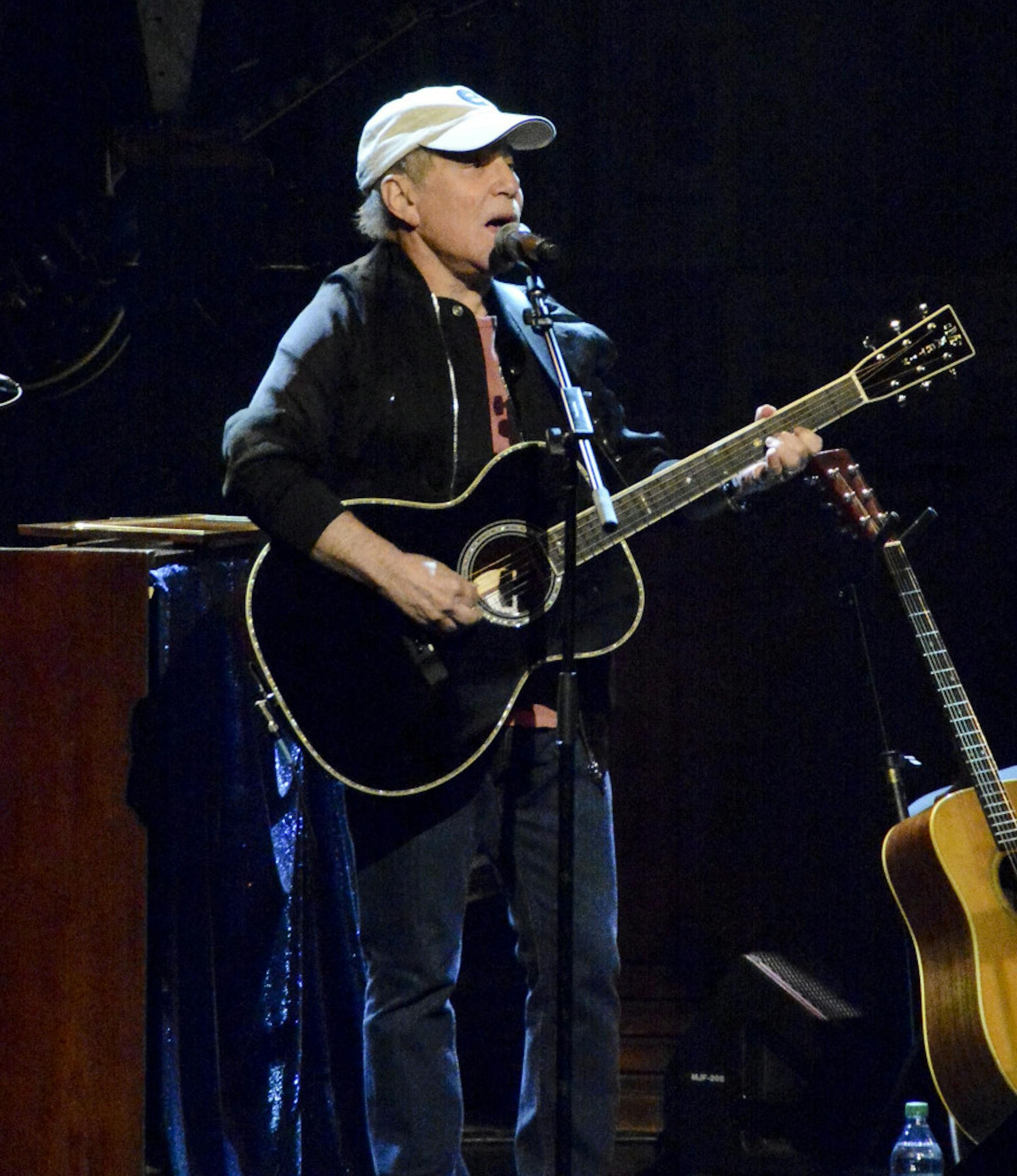Musician Paul Simon, of folk-rock duo Simon & Garfunkel, performed to a packed Distler Performance Hall in the Perry and Marty Granoff Music Center yesterday afternoon. About 300 people were in attendance. Following the performance, Simon participated in a question-and-answer session with members of the audience.
Simon has won 16 Grammy Awards, received Kennedy Center Honors and was elected to the American Academy of Arts and Sciences in 2011. Simon is also a philanthropist who co-founded the Children’s Health Fund and has raised millions of dollars for organizations such as Autism Speaks, the Nature Conservancy and the Half-Earth Project, according to a program distributed at the event.
Simon recently announced the beginning of his farewell concert tour, "Homeward Bound — The Farewell Tour," across North America and Europe, his final tour after a career that has spanned 50 years.
Simon was introduced by University President Anthony Monaco and David Locke, professor of music and chair of the music department. Locke praised the Granoff Music Center, saying that it enables all members of the Tufts community to engage with music. Monaco said that the afternoon concert was in celebration of the establishment of the Granoff Music Center in February 2007, and he thanked Perry and Marty Granoff, Stephen Distler (A '74), Roxanne Kendall (J '75), former University President Lawrence Bacow and Adele Fleet Bacow for their donations and fundraising efforts in building the Granoff Music Center and Distler Performance Hall.
When Simon took the stage with an acoustic guitar, he was accompanied by Mark Stewart on acoustic guitar and cello. Stewart is a multi-instrumentalist and former artist-in-residence at MIT.
Simon, who first gained fame as part of Simon & Garfunkel, played classics such as “America” from their album "Bookends" (1968), “Homeward Bound” from their album "Parsley, Sage, Rosemary and Thyme" (1966), and “The Sound of Silence” from their 1963 album "Wednesday Morning, 3 A.M."
“I played here with Artie in 1967, so I’m playing songs from 1967,” Simon quipped after performing “America,” referencing a past Simon & Garfunkel performance at Tufts during the 1967 Winter Weekend.
Simon also played songs from his extensive solo career, such as “Mother and Child Reunion” and “Me and Julio Down by the Schoolyard” from his album "Paul Simon" (1972), and “American Tune” from "There Goes Rhymin’ Simon" (1973). Simon also played a cover of The Beatles’ “Here Comes the Sun” from "Abbey Road" (1969). He closed with a performance of his more recent song “Questions for the Angels” from "So Beautiful or So What" (2011).
Simon’s sense of humor was apparent throughout his set. After performing a brief cover of Elvis Presley’s version of“Mystery Train” (1956) that segued into Simon & Garfunkel classic “Mrs. Robinson," (1968) Simon joked with the crowd, asking for requests.
He then told an anecdote about a “copiously weeping” woman who kept requesting a song at one of his shows. Simon said that he could not understand the woman’s request through her tears and assumed that she may have been requesting a Paul Simon song that held deep personal meaning. He finally realized that the woman was saying “Please, play 'The Lion King!'”
While performing Simon & Garfunkel hit “The Boxer,” from their 1970 album "Bridge over Troubled Water," Simon encouraged the audience to sing along to the song’s widely-known chorus, and many did. Simon received multiple standing ovations.
After his set, Simon spoke with Joseph Auner, Austin Fletcher Professor of Music and Dean of Academic Affairs, and answered audience questions.
“I was fortunate enough to work with several studio bands that were exceptional and became very well-known,” Simon said, while discussing his creative process.
Simon said his music has been heavily influenced by places and musicians he has visited around the world. He referenced musical groups such as Los Incas — a group from Argentina known for performing Andean music, who accompanied Simon & Garfunkel on their song “El Cóndor Pasa (If I Could)” and went on to tour with Simon — as well as Ladysmith Black Mambazo, a South African male choral group who sang with Simon on his acclaimed 1986 album "Graceland", which was partially recorded in South Africa.
He told the audience about traveling to Jamaica to try to pinpoint a sound he thought was ska that he wanted to use in a song. However, upon speaking to Jamaican band Toots and the Maytals, he was told that the sound he was looking for was not ska, but reggae.
“So they played it, and I said, okay, yeah, let’s do reggae,” Simon said.
Another moment of humor came later in the question-and-answer session, when an audience member asked Simon what his inspiration for writing his cryptic solo hit, “Me and Julio Down by the Schoolyard,” (1972) was.
“I am very often asked that question, and I never answer it,” Simon responded, to audience laughter.
An audience member asked Simon about leveraging his platform as a musician in order to pursue projects that progress society. Simon responded by talking about his failed 1998 musical "The Capeman" written about the life of convicted murderer Salvador Agrón, which suffered from poor reviews and, in his words, “wasn’t well-written.”
However, Simon said that negative responses to his music do not bother him.
Simon continued by talking about being able to use music to make a statement.
“If you’re going to do music, you don’t have to do anything other than play music. That is enough to bring people together in a way that’s nonverbal,” Simon said. “But if you want to add a political aspect to what you’re doing, you can. The downside is that you alienate the group of people who aren’t on your side, you know? But again, I say, ‘So what?’”
"Do what you want, but make the music good,” he added, in closing.
Paul Simon performs hits in celebration of Granoff Music Center's establishment

Paul Simon performs at Lincoln Center in Manhattan on April 25.





